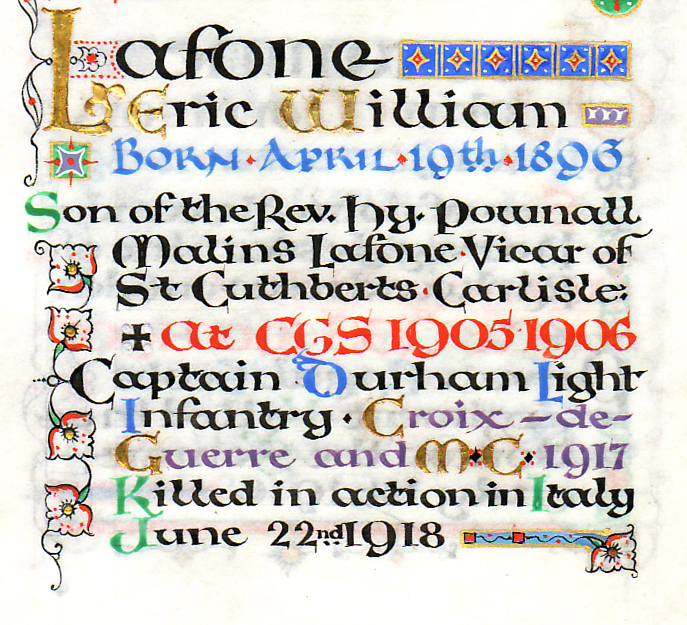After school Eric went to Cambridge and later joined the Durham Light Infantry. Not long after, his father the Archdeacon Lafone of Barrow-in-Furness received a telegram on the 22nd July 1916 “Regret to inform you that Lt. E.W.Lafone Durham Light Infantry was admitted 14 General Hospital Wimereaux July 19th with gunshot wound and compound fracture of the left arm. Severe, further reports”
Eric received La Croix De Guerre the French Medal in 1917 for his bravery on July 17 1916 at Pozieres France. Eric recovered from his injuries and returned to his regiment as Captain, fighting in Asiago Italy. It was here in 1918 that he was killed.
The following are reports about his death.
From The London Gazetteer dated 17th September 1917
Temporary.Capt.Eric William Lafone, Durham Light Infantry.
For conspicuous gallantry and devotion to duty, when commanding his company during an attack. He kept them well together under exceptionally trying conditions, when they were suffering heavily from our own guns, but by skilful leading he was able to shift his position and lessen the casualties, afterwards gaining the final objective. His untiring efforts were mainly responsible for the ultimate success of the operation.
A newspaper article in the Uruguay Weekly News dated the 22nd December 1918 reported the circumstances of his death. Captain Eric Lafone went out with a machine gun beyond the wires when the Austrians were pressing a trench to the left. He seems to have mown them down until wounded on the head by a piece of shrapnel. Three men then wanted to fetch him in, but he replied “Get in yourselves and take the gun, I can crawl in”. While doing so he was caught by a sniper and killed.
His Colonel wrote to the Archdeacon Lafone conveying to him the sympathy of every officer and man in his Battalion on the death of his son, who was killed in the early stages of an Austrian attack. He said “ I have looked upon your son as my right hand man and recently I put his name forward for a Majority, in the hope of soon making him my second in command. One of the bravest men I have ever met, he was equally loyal to his C.O. and his men. No scheming private could get round him, but he would do anything to serve his men and he was absolutely just: these are his characteristics which never fail to win the hearts of British soldiers, and there is nothing better worth winning. I know the Brigadier and G.O.C. Division share my views. I told him “Lafone is as brave as two tigers” to which he replied “Yes and as gentle as two women”. Your boy was a gallant officer because he was a typical gentleman. The sympathy of a stranger can be of no value to you, but the love and respect of 800 brave men has a value. He will be buried tonight in the British Military Cemetery and will lie, as a soldier should beside the men he led and loved. My pioneers are making a cross to mark his grave. I have lost a comrade who might have been my son, but who was in fact my companion in joys and my ready help in troubles”.
Another letter written to the archdeacon from Cuthbert Vaux second in command to Eric reads—When I was wounded Eric was the first person to find and dig me out. On many occasions when shells have burnt in out section I have seen him rush out of the dugout and help wounded men out of trouble. The gallant manner in which he has behaved in the many attacks in which he has taken part. The men loved him and knew that they were safe when under his command. Another incident occurred on the Asiago Plateau Eric took out a reconoitery patrol of half a dozen men when suddenly a party of some 50 Austrians charged them. Most people would have turned and run but he got his six men down and opened fire at them and broke the group up. This is only one of the many incidents that go to prove his extraordinary character.
Private Farrington, Eric’s servant for the three months prior to his death took all his belongings and handed them to the orderly room to be returned to the next of kin.
Captain Eric Lafone was mentioned in a Despatch from General Plumer dated 18th April 1918 he was awarded the Military Cross.
Eric was buried in Granezza British Cemetery Asiago Italy; his grave was marked by a durable wooden cross with an inscription plot 2 row D grave 7.

